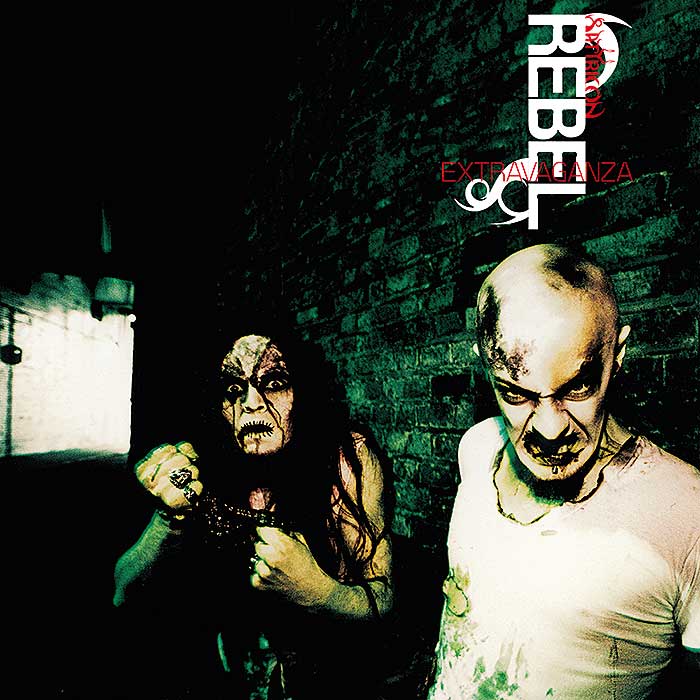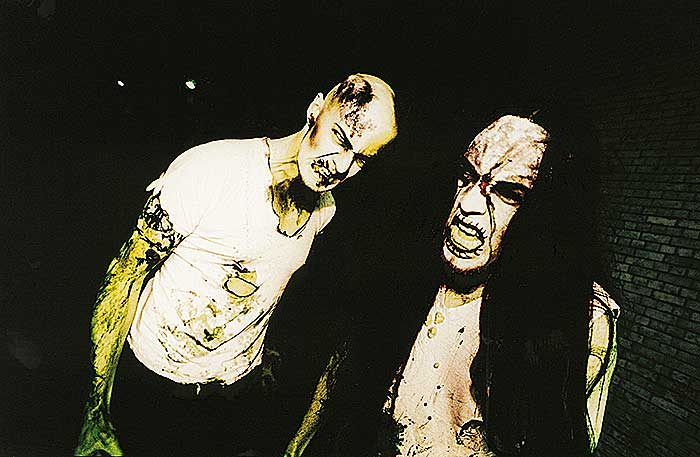INTERVIEW WITH FROST BY GEORGE PACHECO
Hindsight can be a funny thing. I’ll admit that, at the time, I didn’t quite hip myself to what Satyricon was doing with their fourth full-length LP, Rebel Extravaganza [1999]. Gone were the medieval trappings of The Shadowthrone and Nemesis Divina, and in its place were songs that were cold and aggressive, with a very noticeable mean streak. Oh sure, I eventually grew to dig the album pretty hard, based largely on the presence of undeniable jams like “Havoc Vulture” and “Filthgrinder,” but the actual sound of the album always felt like it could’ve used improvement. Twenty years later, and we have a fresh remaster on our hands courtesy of Napalm Records, and an excuse to look back upon this time with drummer Frost. And you know what? In hindsight, Rebel Extravaganza seems more than just a turning point for Satyricon—it feels like a benchmark.
It’s hard to believe that Rebel Extravaganza is 20-years-old, but here we are with a reissue and remaster. Satyricon has obviously grown very much since this album, but is it fair to say that Rebel Extravaganza was a turning point from what you had been doing from Dark Medieval Times through Nemesis Divina? Can you recall what recording this album meant to you at the time, and what the atmosphere was like during the sessions?
Rebel Extravaganza was indeed a turning point for us. Whereas our three first albums were to a large extent inspired by nature, culture, history, and folklore, Rebel had an entirely different fundament. We felt that we had somehow reached the end of the road with Nemesis Divina, and that Satyricon needed a new direction, a different approach and hence a major change in expression. Making Rebel was also about our reaction to the development we saw in black metal in the late 90s, which we weren’t happy about at all. Where a clear majority of black metal bands were leaning more and more towards grand and pompous orchestral arrangements, applying gothic elements, having clean vocals, giving more space to keyboards, and in general softening up their music, we felt strongly compelled to the opposite. So, we put emphasis on hard and raw guitar riffs, cultivating a grim, cold and hostile expression, and bringing in the dirtiness and decay. This was the aggression and the darkness that, in our opinion, suited a black metal album by a leading band at that time. To this we added some dark soundscapes and samples, adding further to the cold vibe and eccentricity of Rebel Extravaganza. Recording the album was much about getting in touch with the extremity of it, also with the filth and the twistedness it had, and lastly about daring to be experimental and creative. A very exciting time indeed, and also highly rewarding, even if we had to push ourselves to the limit in order to make the recording become what we envisioned it to be.
“I AM STRUCK BY HOW FRESH, AGGRESSIVE, AND CUTTING-EDGE THAT ALBUM SOUNDS TODAY, AND THE MUSIC DESERVES TO BE HONORED BY THIS RE-RELEASE.”
Oftentimes bands go back to their older work and try to re-record them, and this usually has uneven results. Here, I feel that the album sounds warmer, with better bass levels that made listening to it both nostalgic and exciting at the same time. The feeling is still there, but the riffs and songs are even more effective. What were your goals when deciding to revisit Rebel Extravaganza in this way, and what were your emotions listening to the album again in its entirety and in sequence?
Re-releasing an album is to us about putting the music of an old release back into the spotlight, and do just those subtle but important changes and adjustments to the sound that makes it a little better than the original even if the expression and feeling is fully preserved. I am struck by how fresh, aggressive, and cutting-edge that album sounds today, and the music deserves to be honored by this re-release.

Rebel Extravaganza was notable for how cold and harsh it sounded, as opposed to the more medieval and melodic elements that defined albums like The Shadowthrone. Black metal at the time was very romantic, yet Satyricon decided to forge ahead with a new sound. Was it exciting or nervous to expand the band’s sound in this way, and was it important to always be ahead of the curve and to be a leader?
To us, it felt like a necessity and, to some extent, also a responsibility, to react musically to what was going on in the genre at the time. Our position was one of genuine passion for black metal, and we were also intrigued by the potential for creativity, boldness, and extremity that could be expressed within this musical world. Seeing how so many acts turned to the mediocre, dull, soft, accessible, or pompous was disappointing and disheartening to us, and we decided that we could in no way be part of that development. We wanted to bring in a rather radical change after Nemesis Divina anyway, but seeing what was going on in our scene only pushed us further into the leftfield. Hence we ended up doing an album that represented more or less the opposite of what the majority of black metal bands did.
Songs like “Havoc Vulture” also introduced the rock ‘n’ roll elements that would be honed and developed further on Volcano. At the same time, your drumming seemed to focus on driving the songs, as opposed to a constant blast. There was more experimenting with minimalist beats, and it definitely helped Rebel Extravaganza further define the Satyricon legacy. Was this intentional on your part to try and shift the band’s songwriting and keep the music fresh?
Since this took place a long time ago, I cannot recall exactly how it all was done, but I believe most of the drum solutions came about partly as a result of my own ideas and my development, which was quite driven towards the aggressive and intense, and partly they came from Satyr’s ideas as a composer. Satyr has always been the driving force for change and more open-minded thinking in the band, in addition to being the creative source behind the songs, so his visions and ideas would have an impact on everything, being the details in the guitar and bass arrangements, drum arrangements, or production. It makes sense to say that the drum arrangements are to a large extent my interpretation of Satyr’s ideas.
“MANY THAT STRIVED TO GRASP THE ALBUM AS IT WAS RELEASED, LATER BECAME VERY FOND OF IT AND EVENTUALLY CAME TO RANK IT AS THEIR FAVORITE ALBUM.”
Much was made at the time about the so-called industrial elements on Rebel Extravaganza, something that I never quite heard. Do you think that critics and fans saw the new promotional photos you guys were taking, heard the harsh production and songwriting, and just connected dots that weren’t there? Or maybe were more hung up on the Intermezzo EP that came before? Also, do you feel that this new remaster distances the album away from those comparisons even further?
I fully agree with you. We were extremely surprised ourselves by how so many seemed to hear qualities of Rebel Extravaganza that simply weren’t there. That “connect the dots” theory probably makes good sense. I suppose that many that actually did listen to a lot of industrial music back in the day didn’t understand much of those mentioned reactions, and I believe that Rebel is heard and understood in a different way today. What we do know, at least, is that many that strived to grasp the album as it was released, later became very fond of it and eventually came to rank it as their favorite album. That fact makes the re-release even more meaningful.

Yourself and Satyr were assisted by friends from Cadaver, Darkthrone, and Thorns for the album, among others. Can you recall what it was like working with Fenriz, Anders, and Snorre on the record, as well as introducing elements like Hammond organ into the band’s sound?
I experienced that several of us that operated within this rather eccentric and weird environment in a small country intuitively bonded as colleagues and friends, and we realized that helping each other out would be a win-win situation. When you’re in a band and feel that you are stuck in some unfortunate pattern or strive to realize an idea, bringing in someone from the outside often turns out to be a game changer. Whether what is brought in is musical advice, musical ideas, or simply an opinion, it could be what breaks a gridlock and takes you further. For a variety of reasons, there were some people from high-profile bands here in Norway that teamed up in the mid 90s and built a small creative and resourceful network, and helped each other out in various ways. Working with people like Snorre, Anders, and Fenriz has no doubt had a positive effect on our musical development, and the collaboration happened in an atmosphere of profound mutual respect.
Around this time I can recall loving the Roadkill Extravaganza home video, which was a fascinating look at Satyricon during this era. It also helped dispel a bit of mystique about the constant seriousness of black metal by showing a lot of Satyricon on the road. What do you recall about all of the shenanigans behind the filming of this home video?
Roadkill Extravaganza certainly has its merits, I don’t doubt that, but personally I try to forget about the whole thing. I am in no way amused by it anymore.
Of course, Rebel Extravaganza wasn’t the end of the Satyricon story, but rather a new beginning of sorts. Do you feel like the creation of this album helped the band progress through the albums that came later in your career, from The Age of Nero and Now, Diabolical through Deep Calleth Upon Deep?
The bold steps we took with Rebel Extravaganza paved the way for yet another approach and way of musical thinking, and I believe that after having made several colossal riff-o-rama songs like “Tied in Bronze Chains” and “The Scorn Torrent,” it made sense to turn to more traditional song structures and learning to master that format. A much firmer structuring of the songs was applied as a fundamental principle from Volcano on.
“THE BOLD STEPS WE TOOK WITH REBEL EXTRAVAGANZA PAVED THE WAY FOR YET ANOTHER APPROACH AND WAY OF MUSICAL THINKING”
If you were to ask a Satyricon fan what was the definitive album from the band, you’d get many different answers. Do you feel Rebel Extravaganza is a strong contender for this category, and what do you feel is the enduring legacy of the album? Have you and Satyr discussed the album’s reputation at length over the years?
We have gotten a lot of feedback from fans, colleagues, music journalists, record company people, and others that clearly indicates that Rebel Extravaganza is a favorite album for many, and indeed it was this type of feedback that led us to re-release the album. The position Rebel has today as a game changer album tells a lot about what an impact it had at the time of release and what importance it still has for a lot of people. We know that the album inspired other bands to find a new direction, to experiment and be more daring, and we know that it changed the perception many people had of black metal and what black metal could be. And that is certainly no small legacy.




















